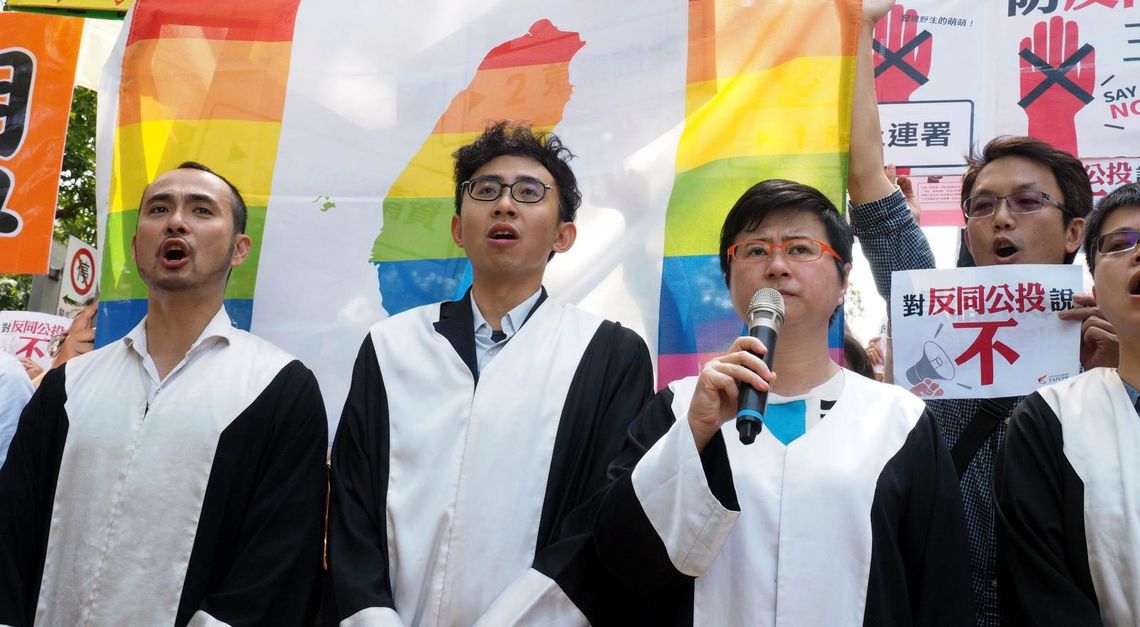Conservatives are trying to derail marriage equality from becoming law in Taiwan
By Isabella Steger August 31, 2018
In May 2017, Taiwan’s top court ruled that same-sex marriage was a constitutional right, paving the way for it to become the first territory in Asia to enshrine marriage equality into law. That outcome, however, is anything but a done deal.
Conservative groups, including many Christian churches, are mobilizing to push back against marriage equality ahead of the May 2019 deadline by which, according to the court’s judgment, same-sex marriage will automatically become law. These groups hope to hold referendums in November—alongside crucial local elections nationwide—on the public’s acceptance of same-sex marriage.
Taiwan is the most LGBT-friendly country in Asia, and many of its citizens take pride in its progressive values, especially as none of its neighbors have made moves to legalize same-sex marriage. For many Taiwanese, burnishing the country’s achievements in human rights is also important particularly at a time when Beijing is mounting an increasingly aggressive global campaign to assert its territorial claims over the island—including an attempt to ban it from competing under the name “Taiwan” at the recent Gay Games in Paris. Many LGBT people in China, not surprisingly, look to Taiwan for inspiration in their own fight for equality in their country.
Equal but different
This week, conservative group Happiness of the Next Generation Alliance said it had received well over the number of signatures required by electoral authorities for three referendums to go ahead. Two of them essentially ask whether marriage should continue to be defined as that between a man and a woman (as it is now in Taiwan law), and whether the current civil code should be amended for same-sex marriage to be recognized. Another seeks to roll back LGBT-inclusive education in elementary and high schools, which has been mandatory since 2004.
“The collapse of the family system will deal a huge blow to society,” said a spokesperson for the group.
To hold a referendum in Taiwan, organizers must collect over 280,000 signatures, equivalent to about 1.5% of the electorate. Referendums are legally binding in Taiwan.
If the referendums show that a majority of Taiwanese are against same-sex marriage, LGBT rights advocates fear that it could result in the government introducing a watered-down version of marriage that leaves gay couples “equal but different,” through the creation of a same-sex partnership law that gives them legal protections short of what is accorded to heterosexual marriages. The fairer outcome, they argue, is to amend Taiwan’s civil code such that marriage is no longer defined as being between a man and a woman.
In response to the offensive by conservative groups, supporters of marriage equality will launch their own referendum in November asking the public to support amending the civil code. Booths manned by volunteers and adorned with the rainbow flag could be seen at busy subway stations around Taipei in recent months, as they worked to collect enough signatures by an Aug. 31 deadline to file their request for the referendum.
“The conservative groups have always said that they’re going to fight the court’s judgment,” said Mindy Chiu, 35, a stay-at-home mom in the city of Taoyuan. “They’ll try all kinds of ways to block marriage equality.” She is particularly upset with what she says are disinformation and smear campaigns by such groups against LGBT people, and reports that some companies had forced employees to sign petitions against same-sex marriage.
In one such case, the head of the Taiwan division of Korea’s Hyundai Motors was investigated by (link in Chinese) authorities for allegedly encouraging employees to sign the petition and offering a cash incentive for doing so. Local media reported that he was ultimately not charged because of a lack of evidence.
A “popularity contest”
Some fear that putting an issue like marriage equality to a referendum risks making sexual minorities vulnerable to the sort of fractiousness and ugliness that accompanied similar plebiscites in Australia last year and Ireland in 2015.
“A referendum on a fundamental rights issue like marriage equality in effect submits the human rights of same-sex couples to a popularity contest,” wrote non-governmental organization Human Rights Watch earlier this year with regards to marriage equality in Taiwan. “Part of the responsibility of the legislature and the judiciary is to uphold and protect minority rights.”
But president Tsai Ing-wen herself, despite expressing support for same-sex marriage in the past, was non-committal in a recent interview over whether the government would push to enact such a law.
Victoria Hsu, executive director of the Taiwan Alliance to Promote Civil Partnership Rights, is a lawyer representing a number of clients in administrative courts in Taipei to thwart the referendums on the grounds that they are unconstitutional. She fears that anti-gay groups will be able to whip up enough opposition in Taiwanese society to pressure the government, particularly on the eve of crucial elections, to create a separate law for same-sex partnerships in the name of public opinion.
“Their main goal is political influence,” Hsu said. “They are trying to show their muscle and threaten parliament.”
This week, Chiu spent an evening volunteering at a booth collecting signatures outside a theater in Taoyuan with her daughter and wife holding signs that read “I support marriage equality so that everyone can be together with the ones they love.”
“Holding a referendum is a right that our government gives its people,” she said. “But why do we, and all our neighbors, family, and friends, have to give so much of our time and effort for a right that we already should have in the first place?”
This story has been updated to reflect that pro-marriage-equality groups also managed to collect enough signatures by Aug. 31 to file for their own referendum in November on same-sex marriage.
發佈日期: 2018/09/02


轉
推
+1
寄